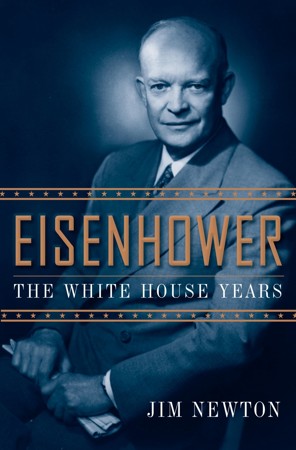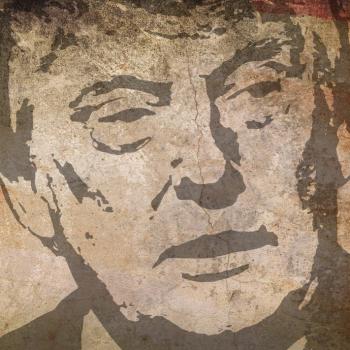 I’ve read several books where Dwight D. Eisenhower was a principal player, most notably as a general in World War II. This book, however, was the first historical biography (I’ve read) that exclusively chronicled the White House years of Eisenhower. Part of my interest in the 1950s stems from the idyllic place it holds in the lore of American culture. For many, the 1950s was the high point, the pinnacle of American success. Many older Americans who look at today’s culture with disdain hearken longingly back to the “good old days.” The “good old days” typically refers to the 1950s. So, since Eisenhower was president during eight of the ten years, he was one of the principal leaders of America’s ‘golden age.’
I’ve read several books where Dwight D. Eisenhower was a principal player, most notably as a general in World War II. This book, however, was the first historical biography (I’ve read) that exclusively chronicled the White House years of Eisenhower. Part of my interest in the 1950s stems from the idyllic place it holds in the lore of American culture. For many, the 1950s was the high point, the pinnacle of American success. Many older Americans who look at today’s culture with disdain hearken longingly back to the “good old days.” The “good old days” typically refers to the 1950s. So, since Eisenhower was president during eight of the ten years, he was one of the principal leaders of America’s ‘golden age.’
One of the greatest misperceptions of Eisenhower was that his presidency was marred with inaction. Caricatures of Eisenhower as president include him as an old man, him always on the golf course, him out of touch with even his own presidency. The reality couldn’t be more different. Eisenhower dealt with an innumerable amount of crises, many of which we’re just now learning about.
What dominated the White House years was the ongoing struggle with the Soviet Union, known as the Cold War. While the United States and the Soviet Union never directly confronted each other on the battlefield, they fought in several proxy wars, including conflicts in Africa, Asia, and South America, several of which pushed the two nations to the brink of nuclear war. Eisenhower chose a complicated but successful strategy to contain Soviet aggression where possible, and to use subversive methods to topple governments loyal to the Soviet Union. America’s modern-day issues with North Korea and Iran date back to the 1950s and Eisenhower’s administration.
Eisenhower also dealt with shutting down an unpopular and unsuccessful war in Korea and the scourge of McCarthyism. Korea was an armed response to Soviet aggression that started during the Truman administration, cost thousands of American lives, and was ultimately unsuccessful. Coming in, Eisenhower saw that directly attacking the Soviet Union would prove cataclysmic, especially since both quickly had the capacity to mutually destroy each other with nuclear weapons. He wound down the Korean War and utilized other options to contain Soviet aggression. The reason we don’t read about an Iranian war, a Guatemalan War, a Philippine war or a Chinese war is because Eisenhower successfully resolved those hot spots without committing American troops. At the end of Eisenhower’s administration, the new hotspot of Soviet aggression was Vietnam. John F. Kennedy (Eisenhower’s successor), chose to reverse Eisenhower’s policy and commit American troops. If you know anything about the Vietnam War, then you know that it did nothing but validate Eisenhower’s strategy.
There were tons of interesting tidbits I picked up while reading this 400 page behemoth, but I won’t bore you with trivia. Here’s what I did learn: Eisenhower was an incredible president. I truly believe that the threat of war (and possibly nuclear war) with the Soviet Union was so precipitous, any less of a president would have resulted in World War III. Eisenhower’s greatness is understated because he never sought the limelight. He was the last president we had that was not a professional politician. No one really knew his politics before he declared himself a Republican right before he ran.
In everything, Eisenhower sought the “middle way.” A philosophy born out of his roots in the Midwest, the “middle way” represented the center of American politics. The extremes on either side of the political spectrum were constantly furious with them. He didn’t pander. He didn’t play to a specific political base. He sought a balanced approach, in politics and in war.
LESSONS LEARNED
1. Everything rises or falls on leadership. America’s greatness in the 1950s in many ways comes back to Eisenhower’s leadership. During an incredibly tumultuous time (just as tumultuous as the time leading up to World War II), Eisenhower’s steady leadership allowed American to flourish into the nation that it is today. When good leaders are in places of leadership, everyone wins.
2. American politics haven’t looked the same since Eisenhower. You don’t see Eisenhower’s style of political leadership anywhere in the political landscape today. Modern politics is dominated by partisanship and bickering. It’s about creating a majority and bludgeoning the minority with it. I think America could greatly benefit from a 1950s style leader like Ike.
3. Great leaders don’t need the spotlight to validate themselves. During the early 1950s, Eisenhower went to task with Senator McCarthy, a blowhard egomaniac who used the bully pulpit of his senatorial position to spread the fear of Communism to an unhealthy level. He reveled in the spotlight. He needed it. Throughout McCarthy’s reign of terror, Eisenhower deprived McCarthy of the one thing he wanted the most: attention. Ike refused to engage McCarthy, allowing him to burn out on his own. Within a few years, McCarthy was invalidated and died a short time later. The contrast between these two American leaders is stark. McCarthy craved the limelight; Ike didn’t need it to validate himself. Good leaders don’t need it.
4. Balance is a beautiful thing. In Ike’s approach to Communism and his approach to American governance, he sought balance. He infuriated Republicans by not cutting more taxes, and he infuriated Democrats by not providing more social welfare. With Communism, he didn’t make every conflict a hill to die on. He took a hard line when the Soviet Union threatened Berlin, but took a softer stance when they threatened outlying islands off the coast of China. His balanced approach was an incredible testament to his wisdom and discernment. Whether it’s American politics or church leadership, we could all use a little more wisdom and discernment, to reject unhealthy extremes and strive for balance.
QUESTION: What’s the number one quality you expect out of a good president?











